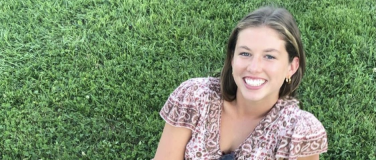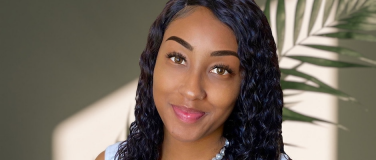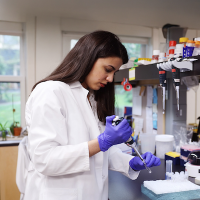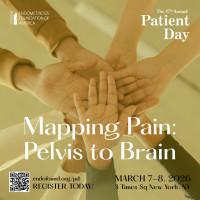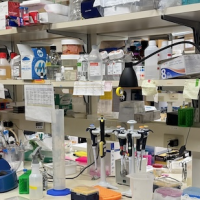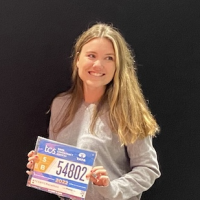Hello, my name is Merve and I am one in ten. I want to take you through my endometriosis journey as I don’t know how I would survive and continue living a close to normal life if I didn’t have other women talking about endometriosis. If it weren’t for the brave and strong women out there, I would still be in a depression, in this dark rabbit hole, desperate for answers but unable to see any light. Those women helped me find the light and I am grateful for every single one of them.
Twenty years. It took me twenty years to get answers. I had my first period when I was fourteen and from the get-go, it was painful with very heavy bleeding. I had bloating and experienced stabbing pain shooting from my groin to my abdomen and lower back. Like every other girl my age, I was confused. I knew that all women have periods at some point in time, but nobody said anything about pain. I remember how my mom gave me the talk and said, “You are not alone, every woman, every month, goes through this and some, unfortunately, experience pain.” I think this is how I started normalizing the pain; seeing my mother and sister go through the same pain every month made me think, this is just how it is.
Fast forward a month: I was going to a camping trip for ten days with my best friends, a trip we were so excited about. This was the beginning of my period haunting every special occasion in my life. I had my period the morning we were supposed to hit the road. The following eight days—yes you read that right, eight full days—I had to sit by the beach and the pool while watching everyone have fun as I had stabbing pain. I was constantly worried that I’d stained the chair I was sitting on every time I moved. It was traumatic because I thought my period was supposed to last for only five days, and the more impatient I was for it to end, the heavier my flow got. That trip quickly made me realize I had to plan my life around my period. Little did I know at that time that my period would haunt me even on my wedding day.
In the following years, I started falling sick almost every time I had my period. I was experiencing nausea, diarrhea, constipation, and even fever. It became a nightmare because painkillers weren’t helping. I was not able to get out of bed and finally one day I fainted in the bathroom and my mom had to carry me to the ER. As the years went by, going to ER was also normalized, and every time I went, they would run tests and tell me, “you are healthy, nothing’s wrong with you, girls your age may experience pain, are you sure you are not exaggerating? just take painkillers three days before and you should be fine.” They said this every single time. Let me tell you, I was never fine. While I was experiencing this, my mom was experiencing similar symptoms. She was getting sick too and she had very heavy periods. She used to come back from work at lunch to change clothes in order to return to work and finish the day. She was always—and I mean this seriously—always really tired. She used to say, “I am sorry darling, unfortunately this runs in the family. My mom was also like you and me, this is just how we are.” In my mind, I just acknowledged this. I accepted it and made peace with it in my own way.
I was missing school and later, I started missing work as well because I couldn’t function normally. Imagine, someone is stabbing your internal organs endlessly for days. It makes you feel impatient, angry, desperate, and definitely isolated. As periods are taboo in almost all cultures, it’s hard to talk about it, which takes a toll on your mental health. What will you tell your employer? How do you explain why you take sick leave every month? I had to have very tough conversations about why I was taking sick leave at least once a month with my employers. I was embarrassed to say I have crazy periods which nail me to my bed, I can’t move, I can’t do even the simplest things like putting on clothes, sorry. I started heavily taking painkillers and sometimes I would even carry a hot water bottle to work that I’d hide under my desk while I hunched over my laptop and worked.
It’s hard to keep up with life when your uterus throws every possible hurdle your way every month. It’s hard to have a routine and keep up with it. Even the simplest things can become a big deal. Your mental health takes the second biggest hit after your organs.
Fast forward to my thirties: I got married, changed jobs and countries, progressed in my career despite the hurdles my uterus put in front of me. I was trying to build a new routine to take better care of myself, but I was constantly bloated, tired, either constipated or having diarrhea, and trying to find my way out of the chaos I go through every month. Soon after, I realized that my pain never went away; it’s bearable some days and horrible before and during my period. For a long time, I thought I had serious bowel issues. I was planning on getting a colonoscopy because I was always uncomfortable, despite eating well and exercising.
As part of my selfcare efforts, I signed myself up for a Pilates class. I was excited, thinking, if I keep up with exercising and eating well, I will find relief. Thirty minutes into the class I almost fainted. I immediately left the class, came back home, and the following week, something I would never wish upon anyone happened.
My husband was in London for business, and I was alone. My period was supposed to start but it didn’t. There I was, bound to the bed, experiencing a whole different level of pain, not able to move or eat. I thought of going to the ER but gave up on that idea quickly as I knew they would give me Ibuprofen and send me back home with a hefty bill. I started looking for OBGYNs because this time the pain was not just on my lower back, groin, or abdomen—it was also in my vagina. I was really scared and I thought I was experiencing an ectopic pregnancy. Three days later, having had no sleep and no food, I found a doctor who would see me. An hour before I saw her, I got my period. I thought of canceling the appointment, but after giving it some thought, I decided to go anyway. The doctor told me that the pain was probably because of my period and wanted me to come back a week later for an ultrasound. When I went back a week later, she did an ultrasound and told me she found a 7cm cyst which looked like endometrioma. She sat me down and told me this will cause a lot of pain; it might be a sign of ovarian cancer and I may never have kids. She said she would do a blood test to see if my cyst was elevated, and if so, that might mean I have ovarian cancer. I left that appointment crying.
I am a 34-year-old woman who made a conscious decision to not have kids until my husband and I were “ready.” I was devastated. I was going to Amsterdam for a week to see my best friend the next day, so I told myself to go and distract yourself until this doctor calls back and gives you more news. I was not only in pain throughout that holiday, but also confused, angry, and really anxious. The doctor called me back and said that my cyst is elevated by a large number. She said it’s almost confirmed I have endometriosis, but looking at the results, it might be ovarian cancer and I should immediately see a specialist. I decided to fly to Turkey (my home country) in order to see doctors there, thinking it would be good to have my family around as my husband had to fly back to New York for work and wasn’t able to come with me. I saw two doctors, endometriosis specialists, who told me, “why did you wait until 34 to have kids, why don’t you get pregnant now, you are probably infertile, you shouldn’t have waited this long, there’s no cure, you will have to learn how to live with this, you need surgery but it will come back, we may need to remove some part of your organs and you might have to live with a bag hanging on your stomach for the rest of your life, get on the pill it will go away,” and so on. I was furious, crying and in disbelief at what I heard. I went back home in shock, and I spent the next two days sitting still, lost. By the third day, I couldn’t sit still anymore and decided to do my own research and understand what this disease is.
I found so much material, but nothing really talked about why or how endometriosis happens. 1 in 10 women suffer from endometriosis globally and it takes eight to twelve years to get diagnosed. I kept reading and reading when I found a movie called “Endo What?” It was almost 3:00 AM in the morning when I was in bed watching and crying. I saw one of the doctors explaining excision surgeries, and the way he talked about the disease and what women experience hit me to my core. I frantically searched his name on google and found that he’s based in New York. This weird calming feeling surrounded me; finally there was some hope. I found his clinic’s website and sent my case to them. But a day later the pandemic hit, and I had no hopes of hearing back. There was also the fact that I may not be able to go back to New York in the foreseeable future.
The next three weeks were stressful; I was trying to book a flight while, of course, having my period again. Three days after I arrived all flights were cancelled. Now we were in a lockdown, we had no idea when I could see a doctor again and my pain was getting worse each day. I was really depressed thinking I would live with this pain forever while trying to work, keep my relationship alive, and act like a normal person. In my head, I constantly repeated to myself, “you may never have kids, hell you might have cancer.” I really struggled keeping a happy face. I was hiding in the corners of my house secretly crying.
Fast forward to May: I finally went to a new doctor. To this day, while I am writing this, I still get goosebumps thinking of it. He sat me down, let me talk for an hour and a half, then told me: “listen, painful periods are not normal. What you have will eat you up, and you can’t live with this pain and expect to have a normal life.” He carefully examined me and explained what endometriosis is, what it does, why it happens, and what my treatment options. Not once did he doubt or question me; he just listened to me in a very compassionate way. He said we need to operate on you to give you a better quality of life. I was scared; I never had surgery before, but I was also relieved to finally know this pain wasn’t all in my head. My pain was real. Everything I had been through, the pain, the depression, the anxiety, the shame of not being able to explain what the hell is wrong with me, was real.
I decided to have the operation because I was finally convinced that someone really understood what I was going through. I wanted to give him a hug and say thank you for just listening to me and to my pain. He was the first doctor to suggest I see a fertility expert to get answers before my surgery—something none of my other doctors did. Thanks to his suggestion, I better understand my fertility and I even learned that I have an auto-immune disease (Hashimotos Disease), which, combined with endometriosis, makes my life even harder. My doctor was genuinely concerned with my wellbeing and he said, “women with endometriosis are strong. It’s not easy to live with this pain and go on about your life. This takes a toll on your mental health, so whatever helps you ease your anxiety, we will help you with it.” He checked in every week, asked me how I was doing, and his clinic was so helpful with every question I had.
I had my surgery in June—yes during a pandemic—as my cyst was at risk of rupture. It was stressful; due to the pandemic my husband was not allowed in the hospital, so I had to go through it by myself. My doctor was with me every step of the way. He made sure I was calm and well taken care of. He came minutes before my surgery and made me listen to a song by one of my favorite singers and said, “don’t worry, everything will be fine, you are in good hands and you will get better very soon.” I remember walking into the operation room, nurses around me having their everyday smalltalk, while I was trying to hold it together. My hands were shaking and I couldn’t stop the tears falling down my face. They lay me down and the lovely anesthetist had to hold my hand and calm me down until I was asleep.
Apparently, my case was worse than what was visible in scans; the surgery, which was supposed to be an hour and a half, took four hours. My appendicitis, my bladder, and my bowel was covered with endometriosis. I woke up scared and in pain but hopeful that I finally had a chance to live a pain free life. The following month and a half were challenging. I couldn’t move around much and I had a stent in my ureter which was giving me serious discomfort. I started getting better slowly but surely, and when the stent was removed, things finally started to feel close to normal.
I don’t know how to explain this but not having pain felt weird after the operation. I was not used to waking up full of energy and ready to take on the day. Here I am, three months post-op, sitting on the patio looking at the lake and letting the serenity surround me, and I am happy to say I am pain free. I had three periods since the operation and boy, was it different. I no longer have to plan my life around my period. I have taken every necessary step post op to get even better. I started a gluten-free, dairy-free, and sugar-free diet. My Mediterranean-self was freaked out in the beginning (aside from healthy greens and vegetables, we feed on cheese and bread), but I am doing unexpectedly well. I am finally feeling like I can take on the world. I can have dreams. I am no longer held back by this disease. This is not to say I found the cure but to say I found hope. I now know a lot about my disease and how I should deal with it.
You might be asking, why did she write all of this? When my doctor handed me one of his books after our first appointment, I wrote a little note on the first page: “To that night at 3:00AM for the glimpse of hope I found, I will heal.” I read that book in tears. I was shocked by the number of women suffering from endometriosis, and reading their stories helped me tremendously before my surgery. I can never thank my doctor enough for giving me my life back and I will be forever grateful that I was lucky to find him.
I am writing this with happy tears falling down my face. I am writing this for the woman who has missed school, work, social outings; the woman who had her period even on her wedding day while she was crippled with pain and bloating but tried to keep on a happy face to feel normal; the woman who has put her head on the pillow and cried not knowing what to do with herself anymore; the woman who is not sure if she wants to get pregnant; the woman who can’t seem to get pregnant. I am writing this for you to tell you simply do not settle until you find answers and don’t be afraid. There are so many of us out there trying to find our way in this life. You are worth it; you are worth the constant search for answers. I want you to know that you are not alone. Me and so many others are there with you, hand in hand, supporting each other, and helping each other find answers. All I want you to know is that you will heal.
Merve Cicek Aypak is a 35 year old female living in New Jersey with her husband and her rescue dog Pluto. She is a global brand manager at a multinational corporation, crafting brands for a living. She was born and raised in Turkey with two other siblings by parents who are both teachers. She spent majority of career in Dubai where she moved as a fresh grad to start her career until she moved to US with her husband. She is passionate about rescue animals, traveling and finding unique stories through unique human connections. Her new passion is to help spread awareness about Endometriosis after spending 20 years looking for answers. Her Instagram account “@beautyendobeast” was opened for her to share her story and experience with other women.
Editor's note: Would you like to contribute to EndoStories? Click here to learn how to submit your work.
*Patient stories submitted to EndoFound.org are the views of the patient and not necessarily those of the foundation. All testimonials are from real patients, and may not reflect the typical patient’s experience, and are not intended to represent or guarantee that anyone will achieve the same or similar results.



